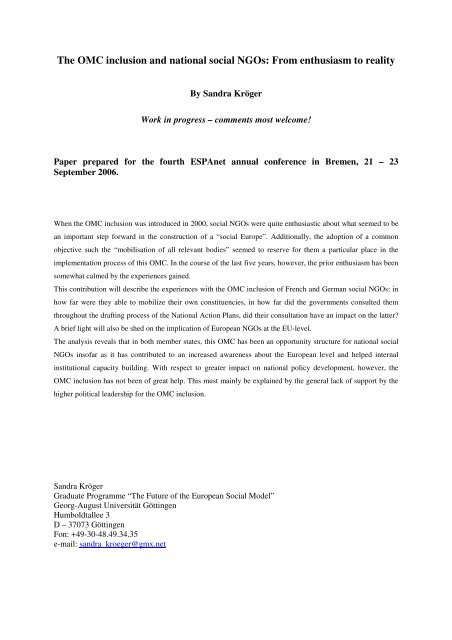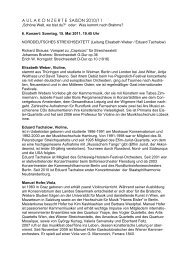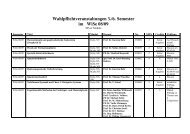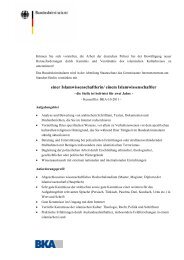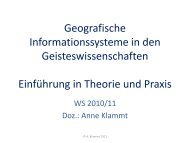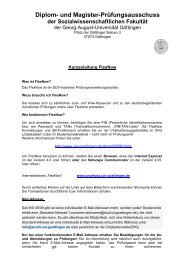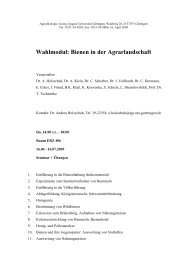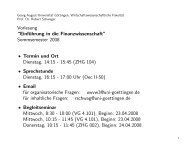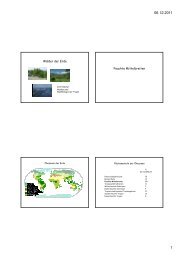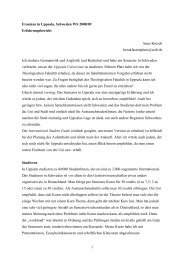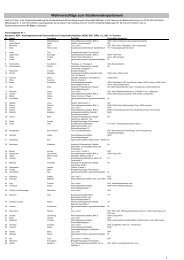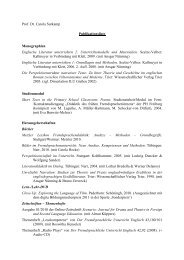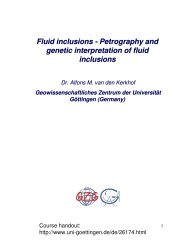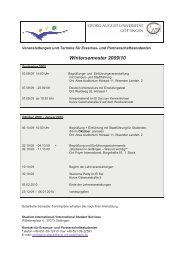The OMC inclusion and national social NGOs: From enthusiasm to ...
The OMC inclusion and national social NGOs: From enthusiasm to ...
The OMC inclusion and national social NGOs: From enthusiasm to ...
Create successful ePaper yourself
Turn your PDF publications into a flip-book with our unique Google optimized e-Paper software.
<strong>The</strong> <strong>OMC</strong> <strong>inclusion</strong> <strong>and</strong> <strong>national</strong> <strong>social</strong> <strong>NGOs</strong>: <strong>From</strong> <strong>enthusiasm</strong> <strong>to</strong> realityBy S<strong>and</strong>ra KrögerWork in progress – comments most welcome!Paper prepared for the fourth ESPAnet annual conference in Bremen, 21 – 23September 2006.When the <strong>OMC</strong> <strong>inclusion</strong> was introduced in 2000, <strong>social</strong> <strong>NGOs</strong> were quite enthusiastic about what seemed <strong>to</strong> bean important step forward in the construction of a “<strong>social</strong> Europe”. Additionally, the adoption of a commonobjective such the “mobilisation of all relevant bodies” seemed <strong>to</strong> reserve for them a particular place in theimplementation process of this <strong>OMC</strong>. In the course of the last five years, however, the prior <strong>enthusiasm</strong> has beensomewhat calmed by the experiences gained.This contribution will describe the experiences with the <strong>OMC</strong> <strong>inclusion</strong> of French <strong>and</strong> German <strong>social</strong> <strong>NGOs</strong>: inhow far were they able <strong>to</strong> mobilize their own constituencies, in how far did the governments consulted themthroughout the drafting process of the National Action Plans, did their consultation have an impact on the latter?A brief light will also be shed on the implication of European <strong>NGOs</strong> at the EU-level.<strong>The</strong> analysis reveals that in both member states, this <strong>OMC</strong> has been an opportunity structure for <strong>national</strong> <strong>social</strong><strong>NGOs</strong> insofar as it has contributed <strong>to</strong> an increased awareness about the European level <strong>and</strong> helped internalinstitutional capacity building. With respect <strong>to</strong> greater impact on <strong>national</strong> policy development, however, the<strong>OMC</strong> <strong>inclusion</strong> has not been of great help. This must mainly be explained by the general lack of support by thehigher political leadership for the <strong>OMC</strong> <strong>inclusion</strong>.S<strong>and</strong>ra KrögerGraduate Programme “<strong>The</strong> Future of the European Social Model”Georg-August Universität GöttingenHumboldtallee 3D – 37073 GöttingenFon: +49-30-48.49.34.35e-mail: s<strong>and</strong>ra_kroeger@gmx.net
1. Introduction<strong>From</strong> the first anti-poverty programme in the 1970s over the discussion about the European<strong>social</strong> model in the 1980s <strong>and</strong> 1990s <strong>to</strong> the introduction of the Open Method of Coordination(<strong>OMC</strong>) <strong>inclusion</strong>, the <strong>social</strong> dimension of the EU has remarkably advanced, even though itstill lags far behind the degree of economic <strong>and</strong> financial integration (Scharpf 1996) <strong>and</strong> mostprobably will continue <strong>to</strong> do so in the future due <strong>to</strong> strong <strong>national</strong> political resistance againstfurther harmonization in the field of <strong>social</strong> policy. <strong>NGOs</strong> did particularly benefit from thedifferent anti-poverty programmes as these <strong>and</strong> the support of the European Commission(hereafter Commission) led <strong>to</strong> the creation of the European Anti-Poverty Network (EAPN) in1990 which since became an important political lobbying organisation <strong>and</strong> informationprovider at EU-level (Halvorsen <strong>and</strong> Johansson 2005), gathering some 21 <strong>national</strong> povertynetworks as well as additional 26 European associations.What about <strong>national</strong> <strong>social</strong> <strong>NGOs</strong>, however? Where they capable of using the institutionbuildingat EU-level (de la Porte 2005) so as <strong>to</strong> increase their impact on domestic policydevelopment? This is the question that the present paper will address. More concretely, itaddresses the question how <strong>national</strong> <strong>social</strong> <strong>NGOs</strong> have reacted <strong>to</strong> <strong>and</strong> dealt with the <strong>OMC</strong><strong>inclusion</strong> (2001-2005) <strong>and</strong> whether its framework has allowed them <strong>to</strong> increase their impac<strong>to</strong>n <strong>national</strong> policy-making. National <strong>social</strong> <strong>NGOs</strong> have been chosen as the <strong>OMC</strong> <strong>inclusion</strong>clearly is an intergovernmental instrument. <strong>The</strong> realisation of its high ambitions, due <strong>to</strong> itsnon-bindingness, completely depends upon member states’ will <strong>to</strong> implement it. <strong>The</strong>refore,the success or failure of this <strong>OMC</strong> must mainly be researched <strong>and</strong> evaluated at domestic level.In order <strong>to</strong> address this question, I am particularly relying on semi-structuredinterviews that I have conducted in France <strong>and</strong> Germany between January 2004 <strong>and</strong>September 2005 1 . Furthermore, I have conducted semi-structured interviews with officialsfrom the Commission <strong>and</strong> several delegates both <strong>to</strong> the Social Protection Committee (7) <strong>and</strong><strong>to</strong> its Indica<strong>to</strong>r-Sub Group (6), the political <strong>and</strong> technical steering committees of this <strong>OMC</strong> aswell as 40 people who participated in the supportive peer review programme. Additionally,official statements from <strong>NGOs</strong> as well as governmental plans have been taken in<strong>to</strong>1 For France, I am drawing on 12 in-depth interviews with involved ac<strong>to</strong>rs that I conducted between January2004 <strong>and</strong> September 2005, four of which with the concerned administrations, two with a Sénateur which is at thesame time the president of the CNLE (see further down) <strong>and</strong> seven with representatives of the main <strong>NGOs</strong>,partly having leading functions within the French <strong>and</strong> European branches of the European Anti-Poverty Network(EAPN). For the German case, I am drawing on 19 in-depth interviews (three on the federal level, six on theregional level, two on the local level, six of <strong>national</strong> <strong>NGOs</strong> <strong>and</strong> two with involved researchers). <strong>The</strong> interviewswere conducted between May <strong>and</strong> November 2005.
consideration. <strong>The</strong> picture is completed by field research done by other scholars, more so inGermany than in France 2 .This contribution is a first account of the empirical findings related <strong>to</strong> the <strong>to</strong>pic of interesthere. It therefore will contend itself with first ad-hoc plausibilisations, <strong>to</strong> be systematised <strong>and</strong>re-thought in a next step. <strong>The</strong> structure of the text is as follows. <strong>The</strong> next section will reviewhow the <strong>OMC</strong> <strong>inclusion</strong> can generally be researched <strong>and</strong> the place of <strong>social</strong> <strong>NGOs</strong> in itparticularly (2). <strong>The</strong> third part will proceed <strong>to</strong> the empirical account of the “relationship”between this <strong>OMC</strong> <strong>and</strong> <strong>national</strong> <strong>social</strong> <strong>NGOs</strong>, with a brief look at the EU-level (3). Finally, apreliminary explanation of the results will be provided before turning <strong>to</strong> a more generaldiscussion of the issues at stake (4).2. Researching the <strong>OMC</strong> <strong>inclusion</strong> in general <strong>and</strong> the role of <strong>national</strong> <strong>social</strong><strong>NGOs</strong> in particular<strong>The</strong> <strong>OMC</strong> <strong>inclusion</strong> exists since 2000. At the end of that year, common objectives wereendorsed <strong>and</strong> one year later common indica<strong>to</strong>rs adopted. Member states agreed <strong>to</strong> writebiennial National Action Plans (NAPs) in which they lay out their policies <strong>and</strong> examples ofso-called good practices; the indica<strong>to</strong>rs can be found in the annexes. A Joint Report of theCommission <strong>and</strong> the Council follows which resembles more a summary than an evaluation ofthe NAPs. Since 2004, there have also been peer reviews 3 . Finally, a Communitarian actionprogramme against <strong>social</strong> exclusion is meant <strong>to</strong> support this <strong>OMC</strong> 4 .Researching the <strong>OMC</strong> <strong>inclusion</strong> – as well as other <strong>social</strong> <strong>OMC</strong>s – is quite difficult. This is sofor several reasons. First, this <strong>OMC</strong> has no binding elements at the EU-level other than thatthe member states did agree, in 2000, <strong>to</strong> develop such a process with common objectives <strong>and</strong><strong>to</strong> write biennial action plans. However, as the common objectives are quite vague 5 <strong>and</strong> asmember states cannot be forced <strong>to</strong> translate them in<strong>to</strong> <strong>national</strong> legislation or programmes, it isquasi impossible <strong>to</strong> causally relate a certain policy development <strong>to</strong> this <strong>OMC</strong> with any sort ofcertainty. Second, the much debated multi-level system that the EU forms adds <strong>to</strong> the(methodological) difficulties, leaving space for many intervening fac<strong>to</strong>rs at varying levels of2 To my knowledge, only a single French researcher has conducted field research about this <strong>OMC</strong>.3 <strong>The</strong>se take place 7-8 times a year. <strong>The</strong>se take place in alterning member states, last one <strong>and</strong> a half days <strong>and</strong> aremeant <strong>to</strong> discuss <strong>and</strong> present particular “good practices” in greater detail, see Kröger 2006a.4 This action programme runs for the period 2002-2006 <strong>and</strong> mounts up <strong>to</strong> 75 million Euro – a small sumcompared with its ambitions. It is run by the Commission <strong>and</strong> has three motivations: foster research <strong>and</strong>statistical work, support exchange of policies <strong>and</strong> networking.5 1) Access <strong>to</strong> employment <strong>and</strong> <strong>to</strong> resources, rights, goods <strong>and</strong> services, 2) prevention of the risks of exclusion,3) help for the most vulnerable <strong>and</strong> 4) mobilisation of all relevant ac<strong>to</strong>rs.
policy development <strong>and</strong> implementation. Third, <strong>and</strong> more related <strong>to</strong> this <strong>OMC</strong> (as well as <strong>to</strong>the other <strong>social</strong> <strong>OMC</strong>s) is their very low degree of public visibility, or, as a French ac<strong>to</strong>r putit, their existence cl<strong>and</strong>estine, making it difficult <strong>to</strong> discover traces of the process - other thanthe official documents, but even these are not always made public – as well as <strong>to</strong> control forwhat one hears or reads. Which leads <strong>to</strong> fourth, a more general difficulty, but particularlypresent in such a sensitive policy area, that the interviewees are all ac<strong>to</strong>rs with institutional<strong>and</strong> / or political <strong>and</strong> normative interests <strong>to</strong> be defended against various other ac<strong>to</strong>rs, makingit even harder <strong>to</strong> come <strong>to</strong> a balanced conclusion. If an ac<strong>to</strong>r mentions the <strong>OMC</strong> as anargument that change occurred, this can be strategically motivated <strong>and</strong> must not necessarilybe true just as the absence of reference must not mean that the <strong>OMC</strong> had no consequences(Büchs 2004).<strong>The</strong>se – <strong>and</strong> other – considerations have been broadly absent or ignored in the conceptual <strong>and</strong>descriptive <strong>OMC</strong> literature which has tended <strong>to</strong> see the <strong>OMC</strong> as a <strong>to</strong>ol for supra<strong>national</strong>learning, mostly concluding that it can promote learning processes <strong>and</strong> eventually, that it hasalready promoted them. I have attempted <strong>to</strong> show that this scholarly majority is mislead withthe learning assumption, or more precisely, in connecting the <strong>OMC</strong> <strong>inclusion</strong> <strong>to</strong> (significant<strong>and</strong> organizational) learning processes, in the way of which st<strong>and</strong> institutional, organisational,political <strong>and</strong> normative differences as well as the organisation of the <strong>OMC</strong> itself (Kröger2006a; Kröger 2006b forthcoming). Interviewees have repeatedly stated that they thought thatlearning processes were taking place in the EU, not through this <strong>OMC</strong>, however. Instead, itmakes more sense <strong>to</strong> evaluate the <strong>OMC</strong> in the well-known categories of effectiveness <strong>and</strong>legitimacy (Offe 1998; Scharpf 1999). Due <strong>to</strong> the non-binding character, effectiveness,however, needs <strong>to</strong> be defined <strong>and</strong> evaluated in different ways (than looking at policyperformances <strong>and</strong> programmes as these cannot be clearly tracked back <strong>to</strong> the <strong>OMC</strong>). Withinmy PhD research, I am differentiating between internal effectiveness <strong>and</strong> externaleffectiveness, the prior relating <strong>to</strong> the domestic, the latter <strong>to</strong> the EU level (Kröger 2005). Bothlevels are analysed in terms of institutional capability building, a necessary predecessor ofpolicy development, <strong>and</strong> therewith effectiveness (Sacchi 2004). Institutional capabilitybuilding happens if resources are increased, if knowledge <strong>and</strong> awareness are increased <strong>and</strong>eventually lead <strong>to</strong> learning processes, if interministerial coordination is increased, if timelydata (indica<strong>to</strong>rs) exists <strong>and</strong> is made available, if one succeeds at placing the process at a highlevel of the involved institutions – a precondition of which is that the process is politicallyaccepted. Summarizing, the <strong>OMC</strong> <strong>inclusion</strong> could said <strong>to</strong> have been effective if it contributed
existing tasks. This seems <strong>to</strong> have been easier in Germany as the large <strong>social</strong> <strong>NGOs</strong> hadalready begun <strong>to</strong> establish at least half-time jobs related <strong>to</strong> EU matters. In both member states,the government did not allocate particular resources <strong>to</strong> this <strong>OMC</strong>, <strong>to</strong> programmes, or <strong>to</strong>human resources.With respect <strong>to</strong> new internal structures, one must divide in<strong>to</strong> two levels. Whereas this <strong>OMC</strong>did not lead <strong>to</strong> new structures within single <strong>NGOs</strong> (except for the large protestant welfareorganisation in Germany where a working group was set up), new structures have emergedamongst them. This is particularly true for the French case. Here, the l<strong>and</strong>scape of charityorganizations is very broad, often following the principle of au<strong>to</strong>nomy <strong>and</strong> subsidiarity(his<strong>to</strong>rical catholic influences). This variety of welfare s<strong>to</strong>od in the way of effectivecommunication <strong>to</strong>wards the state authorities <strong>and</strong> <strong>to</strong>wards the European level. This is why in2003 occurred a reorganisation of the respective consultation structures so as <strong>to</strong> allow formore flexible action <strong>to</strong>wards the state <strong>and</strong> the EU. <strong>NGOs</strong> <strong>to</strong>ok advantage of the process <strong>to</strong>proceed <strong>to</strong> an internal re-organisation, concerning the two main umbrella organizations inFrance, UNIOPPS <strong>and</strong> EAPN-France 10 , which found a way of close cooperation. WhileUNIOPSS is an organisation of approximately 40 <strong>NGOs</strong>, which operate nation-wide, EAPN-France often comprises the same <strong>national</strong> <strong>NGOs</strong>, but additionally nearly all the <strong>social</strong> <strong>NGOs</strong>operating exclusively locally. Evidently, these often very small <strong>NGOs</strong> do not have thefinancial <strong>and</strong> human resources <strong>to</strong> accompany political processes. This is why it was decidedthat the UNIOPSS commission against poverty would furthermore be open <strong>to</strong> members ofEAPN-France. <strong>The</strong> group consists of about 40 persons, meets on a monthly basis <strong>and</strong> nowalso deals with EU issues. When communicating within France, it uses the logo “Alerte”,when communicating with the EU, the same commission operates under “EAPN-France” 11 .For the French case, it meant a real gain of synergies <strong>and</strong> the link <strong>to</strong> the <strong>OMC</strong> is clearly madeby the president of the working group: ”<strong>The</strong> NAP was the catalyst for the French <strong>NGOs</strong> <strong>to</strong>think <strong>to</strong>gether. We had started a little bit, but this was the strongest catalyst” 12 .In Germany, the restructuring was not as important, but this should not surprise as the largewelfare organisations had already been well organised <strong>and</strong> connected before. However, theyalso set up a working group particular related <strong>to</strong> this <strong>OMC</strong>, <strong>and</strong> already in spring 2001 (vs.French case: June 2003). <strong>The</strong> regularity of the meetings varies greatly between monthly10Union Nationale Interfédérale des œuvres et Organismes Privés Sanitaires et Sociaux <strong>and</strong> European Anti-Poverty Network – France.11 Interviews with the president of the UNIOPSS commission against poverty, 26.1.2004 <strong>and</strong> with the then inplace President of EAPN-France, 10.6.2004.12 Ibid.
meetings <strong>and</strong> two meetings a year <strong>and</strong> largely follows the NAP agenda. In June 2003, aworkshop was organised in order <strong>to</strong> link this working group <strong>and</strong> the one working aroundlabour market policies. Both working groups – the French <strong>and</strong> the German – havecontinuously commented on the successive NAPs.Finally, even where no new structures were set up – <strong>and</strong> this holds true for almost all <strong>NGOs</strong>interviewed here, it is reported that the awareness about the European dimension increased.But the <strong>social</strong> <strong>NGOs</strong> have not only mobilized internally, they also tried <strong>to</strong> mobilise outside oftheir own boundaries. This is true particularly for Germany where several attempts weremade, in different regions <strong>and</strong> originating in different large welfare organisations, <strong>to</strong> connectthis <strong>OMC</strong> <strong>to</strong> the regions <strong>and</strong> the local authorities, without success, however. A project meant<strong>to</strong> increase the awareness about this <strong>OMC</strong> has been initiated by a group of <strong>NGOs</strong> <strong>and</strong> waslargely financed by the Communitarian Action Programme against <strong>social</strong> exclusion. <strong>The</strong>opening conference <strong>to</strong>ok place in June 2005 (!) <strong>and</strong> three regional workshops are organized in2005-2006 in order <strong>to</strong> bring the different stakeholders <strong>to</strong>gether, sensibilise them about theEuropean anti-poverty strategy <strong>and</strong> exchange about approaches <strong>to</strong> combat poverty regionally<strong>and</strong> locally. Having been at the opening conference myself, a deficit that one can regularlyobserve at these types of events is the absence, by <strong>and</strong> large, of representatives of the regional<strong>and</strong> local government <strong>and</strong> the economy. Rather, one will tend <strong>to</strong> find representatives of<strong>NGOs</strong>, of local administrations <strong>and</strong> eventually of the academic community. This structuraldeficit, the absence of common fora for all ac<strong>to</strong>rs, obviously does not increase the chances offinding solutions accepted at least by a large majority 13 <strong>and</strong> helping <strong>to</strong> significantly reducepoverty <strong>and</strong> <strong>social</strong> exclusion.For France, it is reported that since 2003 <strong>and</strong> for two years, the <strong>NGOs</strong> have tried <strong>to</strong> organise aconference about the regional implementation of the NAP 14 . Whereas the centraladministration was apparently supportive in the beginning, tensions between the central state<strong>and</strong> the regions have increased since the regional elections in March 2004 which resulted in ashift <strong>to</strong> the left: “It’s the big problem, in France, with respect <strong>to</strong> the European process, thatthere is no participation of the sub-<strong>national</strong> authorities whatsoever. We have tried, in 2005, <strong>to</strong>13 Even though the existence of such for a does not imply that all ac<strong>to</strong>rs are speaking the same (ideological)language.14 Interview with the president of EAPN-France, 29.9.2005.
develop a consultative mechanism. It was not possible due <strong>to</strong> political reasons” 15 . Politicalac<strong>to</strong>rs do simply not wish <strong>to</strong> implement a process established by another political majority 16 .Unsatisfied with their consultation by the central administrations, <strong>NGOs</strong> in both memberstates have asked for regular working groups within the respective administrations <strong>to</strong> beestablished. This was the case in Germany in 2002, <strong>and</strong> in 2003 in France. In both cases, therequest was rejected, or, as in the French case, where a letter was sent, not even answered.Turning <strong>to</strong> the issue of information gathering <strong>and</strong> learning, the results are quitedisillusionating. Information about other member states’ policies <strong>and</strong> so-called good practicesis provided in the NAPs; this information is meant <strong>to</strong> support supra<strong>national</strong> learning processesby providing inspiration for domestic policies from abroad. Two thirds of the intervieweeshad not seen a single other NAP, the rest indicated having seen a few. Equally, only a few hadtaken notice of the Joint Reports of the Commission <strong>and</strong> the Council. Those who hadacknowledged a few NAPs stated that they did not influence own approaches <strong>and</strong> that the“good practices” were of limited use. This scepticism is widely shared, stemming fromdomestic experiences. In France, the successive governments did never include a single NGOpractice in their NAPs but restricted themselves <strong>to</strong> governmental programmes. In Germany,the <strong>NGOs</strong> succeeded <strong>to</strong> place a good amount of practices in one of the annexes (not as official“good practice”) of the NAP 2003-2005. <strong>NGOs</strong> generally criticise that these “good practices”are not sufficiently contextualised, lack information on their financing, <strong>and</strong> that it is not clearwhether the target groups would also qualify the policies as “good practices”. <strong>The</strong> scepticism<strong>to</strong>wards the NAPs is also inspired by the domestic experiences insofar as these are seen asgovernmental reports, aligning policies already in place with a marked tendency <strong>to</strong> keep silentabout shortcomings <strong>and</strong> difficulties of the governmental policies. Finally, some intervieweesmentioned the language barrier as a reason for not having read other NAPs.For <strong>NGOs</strong>, <strong>and</strong> in both member states, “learning” seems <strong>to</strong> have meant <strong>to</strong> discover theEuropean dimension of the fight against poverty <strong>and</strong> <strong>social</strong> exclusion. This is stated by severalof the interviewees in both member states. Here, without any doubt, EAPN <strong>and</strong> its <strong>national</strong>branches have played a pivotal role in disseminating information <strong>and</strong> mobilising theirmembers.15 Interview Direction Générale de l’Action Sociale (DGAS), September 2005. <strong>The</strong> DGAS is the coordina<strong>to</strong>r ofthe process in France.16 Interview NGO key officer, September 2005.
Asked if the <strong>social</strong> <strong>NGOs</strong> had themselves undertaken evaluations of the <strong>OMC</strong> process ingeneral <strong>and</strong> the NAPs in particular, most answered “no”, with two exceptions in France <strong>and</strong>one in Germany, all of which large <strong>NGOs</strong>. Additionally, the six large German welfareassociations proceeded <strong>to</strong> an internal evaluation, in 2002, of the implementation of the NAP(2001). <strong>The</strong> trend <strong>to</strong> no evaluation probably must be linked <strong>to</strong> the above-mentioned lack offinancial <strong>and</strong> human resources. As time went by, it certainly also had <strong>to</strong> do with theunwillingness <strong>to</strong> invest (time) resources in a process that the governments quite apparently didnot take serious.After this overview how <strong>national</strong> <strong>social</strong> <strong>NGOs</strong> used this <strong>OMC</strong> internally, I will now turn <strong>to</strong>the larger policy-making process around it.3.2 <strong>The</strong> “external” implementation of the <strong>OMC</strong> <strong>inclusion</strong>When analysing <strong>and</strong> evaluating the domestic implementation <strong>and</strong> for the methodologicalreasons mentioned above, one necessarily <strong>and</strong> almost exclusively has <strong>to</strong> turn <strong>to</strong> the processesof consultation around the elaboration of the NAPs as these are the only times where some“<strong>OMC</strong> activity” can be tracked down. Since the launch of this <strong>OMC</strong>, there have been threesuch rounds (2001, 2003 <strong>and</strong> 2005).In France, the moni<strong>to</strong>ring of the NAPs lays with the Direction Générale de l’Action Sociale(DGAS) that belongs <strong>to</strong> the ministry of work, <strong>social</strong> cohesion <strong>and</strong> housing. <strong>The</strong> DGAS has atits disposal eleven consultative bodies, amongst which the Conseil National des politiques deLutte contre la pauvreté et l’Exclusion <strong>social</strong>e (CNLE), a political body made up of publicelected representatives, administrations, civil society organisations <strong>and</strong> qualified members.Also, there exists since 1998 an interministerial committee in the fight against poverty <strong>and</strong><strong>social</strong> exclusion, which, however, has only convened once since (July 2004).Here, consultation is reported <strong>to</strong> have been either non-existent or minimal in all three rounds.While the first NAP was “elaborated by a few heads” 17 , the administration did consult theCNLE once in the second round, even though only little time before the h<strong>and</strong>ing-over of thefinal document <strong>to</strong> the Commission 18 . At this meeting, however, representatives of thedevolved authorities were broadly absent, as seems <strong>to</strong> have been the case repeatedly 19 .According <strong>to</strong> several interviewees, there has been no consultation <strong>and</strong> participation17 Interview DGAS key officer, 15.6.200418 See also Br<strong>and</strong>sen et al (2005: 23).19 Interview president of the CNLE, 21.9.2005.
whatsoever of the regions, départements <strong>and</strong> local communities 20 . Since the delegation ofcompetencies <strong>to</strong> the départements in the <strong>social</strong> field, in January 2004, one could expect agreater involvement of the respective authorities in the process – due <strong>to</strong> political opposition,this did not happen so far. <strong>The</strong> last exercise, in 2005, seems <strong>to</strong> have followed the samepattern. Interviewees reported that in 2005, the exercise had been even more formal than in2003, the meeting mainly being a presentation of the Plan de cohésion <strong>social</strong>e, presented inspring 2005. <strong>The</strong> French government does not foresee parliamentarian debate of the NAPs(see also Legros 2005).Besides the consultation process directly linked <strong>to</strong> the elaboration of the NAPs, there havebeen in France a number of initiatives where it is hard <strong>to</strong> tell whether they can be drawn back<strong>to</strong> the <strong>OMC</strong> <strong>inclusion</strong>, even though involved ac<strong>to</strong>rs claim a direct connection. In December2003, the then in place Prime Minister Raffarin received a delegation of <strong>NGOs</strong> in order <strong>to</strong>learn about their concerns. At this meeting, the participants agreed that there should be a first<strong>national</strong> conference on poverty <strong>and</strong> <strong>social</strong> exclusion, <strong>to</strong> be continued on an annual rhythm.This conference <strong>to</strong>ok place in July 2004 <strong>and</strong> gathered, amongst others, all the ministersconcerned. It was directly after the conference that the interministerial committee against<strong>social</strong> exclusion convened for the first time. <strong>The</strong> second “annual” conference <strong>to</strong>ok place inApril 2006. Another rather recent development has been the decision <strong>to</strong> create a text called“document de politique transversale <strong>inclusion</strong> <strong>social</strong>e” (DPT) in the context of the financialact, which regulates the yearly state budget 21 . Finally, the unit in charge of the <strong>OMC</strong> at theDGAS has commissioned an office with the development of an measurement system of theimpacts of the policies in the fight against <strong>social</strong> exclusion on their recipients, which wash<strong>and</strong>ed over in September 2005.<strong>The</strong> German government’s position <strong>to</strong>wards the <strong>OMC</strong> <strong>inclusion</strong> cannot be called but sceptical(see also Huster et al. 2004). <strong>The</strong>re is a profound mistrust that the Commission is slowly butsurely seeking <strong>to</strong> extend its competencies in the area of <strong>social</strong> policies, an idea that is <strong>to</strong>tally<strong>and</strong> repeatedly rejected: „<strong>The</strong> <strong>OMC</strong> holds risks for the protection of <strong>national</strong> competencies. Itshould not mutate <strong>to</strong> a vehicle for system comparison but help <strong>to</strong> find answers for concretequestions. <strong>The</strong> ministry refuses an inflation of common objectives <strong>and</strong> indica<strong>to</strong>rs. It should be20 In 2003, this may be explained by the fact that the main competencies in the <strong>social</strong> field still led with thecentral government, whereas main competencies were shifted <strong>to</strong> the départements <strong>and</strong> local communities as fromJanuary 2004 on.21 Namely the Loi Organique relative aux Lois de Finances (LOLF), an act dating back <strong>to</strong> 1959 <strong>and</strong> revised since2005. In France, there are currently eight such documents in different policy areas; their aim is <strong>to</strong> facilitate <strong>and</strong>improve interministerial cooperation.
checked regularly whether a sneaky erosion of <strong>national</strong> competencies can happen” 22 . Also,one finds in Germany a strong rejection of everything that has <strong>to</strong> do with quantified targetsetting at the European level, ranking, <strong>and</strong> naming <strong>and</strong> shaming strategies 23 : “It is notacceptable <strong>to</strong> us if the useful, necessary <strong>and</strong> openly qualitative comparison is overlaid by afactual grading of even some sort of ranking” 24 .Here, the consultation of the relevant ac<strong>to</strong>rs resembles the one in France with the exceptionsof the regions (Länder) who repeatedly <strong>and</strong> officially voiced their dissent with the <strong>OMC</strong><strong>inclusion</strong>. Unlike in France, the NAP process has had different ministerial affiliations over theyears in Germany which are important as no institutional continuity could be assured at the<strong>to</strong>p levels of political leadership; yet, as in France, the people at the working level whocoordinate the process have largely remained the same since 2001, changing from oneministerial affiliation <strong>to</strong> the other.Comparable <strong>to</strong> the CNLE in France, there is in Germany a so-called permanent advisoryboard gathering regional <strong>and</strong> local representatives, <strong>social</strong> partners, <strong>NGOs</strong> <strong>and</strong> a fewacademics which has been created as a consultative body for the National Report on Poverty<strong>and</strong> Wealth (NARB) <strong>and</strong> was extended, in 2002, <strong>to</strong> the consultation process of the <strong>OMC</strong><strong>inclusion</strong>. Whereas the CNLE meets every 1-2 months, this board convenes 1-2 times a year.However, this body has not been used in order <strong>to</strong> discuss general issues related <strong>to</strong> theimplementation of the <strong>OMC</strong> <strong>inclusion</strong> (see also Miebach 2004: 28). <strong>The</strong> regions can use thesecond chamber, the Bundesrat, <strong>to</strong> issue opinions <strong>and</strong> decisions.For the three rounds, there were consecutively one, two <strong>and</strong> again one meeting(s) 25 . In 2004,the government proceeded <strong>to</strong> a voluntary update of its NAP deemed necessary in the light ofthe so-called Agenda 2010. <strong>The</strong> advisory board was consulted once but without apparentimpact. Finally, in 2005, the advisory board was not consulted at all. While there was noparliamentarian debate in 2001, there have been debates 26 on the NAPs in 2003 <strong>and</strong> 2005,however after their transmission <strong>to</strong> the Commission. However, the Parliament received the22 “We shape the change!”, Ministry for Health <strong>and</strong> Social Affairs, 2004: 45.23 See the opinion of the German government (9.3.2005) on the communication of the Commission of 9 February2005 – COM (2005) 33 final. This evaluation was confirmed by all interviews conducted with the implied civilservants as well as with a German participant of a peer review.24 Ulrike Mauscher, Parliamentary Secretary of State in the Ministry for Work <strong>and</strong> Social Order, at the meetingof the conference of regional ministers for work <strong>and</strong> <strong>social</strong> affairs (ASMK) in November 2001.25 Friedrich 2006 <strong>and</strong> Miebach 2004 come <strong>to</strong> the same conclusions about the nature of the consultation processesof the first two rounds.26 “Debate” should be taken with caution: 45 minutes were accorded <strong>to</strong> six parliamentarians, advancing theirrespective proposals without any further discussion <strong>and</strong> without any particular reference <strong>to</strong> the document or <strong>to</strong>the larger European context
NAPs only after their adaptation by the respective cabinets <strong>and</strong> after their h<strong>and</strong>ing over <strong>to</strong> theCommission.<strong>The</strong> second chamber (Bundesrat) has been very critical <strong>to</strong>wards the <strong>OMC</strong> <strong>inclusion</strong> from thebeginning on. This does not come as a surprise as the German regions hold importantcompetencies in the <strong>social</strong> field as well as financial responsibility, but were in no wayincluded in the establishment of the <strong>OMC</strong> <strong>inclusion</strong> at EU-level which is perceived as adouble intrusion – by the EU <strong>and</strong> the federal government – in their competencies (Büchs <strong>and</strong>Friedrich 2005). Resistance is particularly strong when originating in regions with an opposedpolitical leadership <strong>to</strong> the one in Berlin. If the regions have been opposing the process, thesituation is different as far as cities <strong>and</strong> counties are concerned: here, the <strong>OMC</strong> <strong>inclusion</strong> haslargely remained unidentified <strong>and</strong> where it is known, it is clearly rejected 27 as intrusion in<strong>to</strong>own competencies <strong>and</strong> a bureaucratic process leading nowhere.<strong>The</strong> very little amount <strong>and</strong> the nature of “consultation” – in committees not accessible <strong>to</strong> thepublic or the media – led <strong>to</strong> a very low degree of visibility of the NAPs <strong>and</strong> the <strong>OMC</strong> processmore generally. All interviewees in both countries agree that it remained very low if existentat all. Interestingly, one French civil servant had doubts if the minister of <strong>social</strong> affairs evenknew about the NAPs 28 , adding that “Europe” was not his thing.With these descriptions of the consultation processes in mind, it cannot come as a surprisethat <strong>NGOs</strong> evaluated their impact on the NAPs as being minimal. For the first round (2001-2003), they find that there has been no impact at all. In the second round, French ac<strong>to</strong>rs reportthat the issue of mobilising all ac<strong>to</strong>rs (common objective 4) was taken up due <strong>to</strong> therecommendation of the <strong>NGOs</strong>. However, the measures mentioned in the same NAP werenever realised, relativising this “success”. In the German case, slight impacts of the NGOinvolvement can be tracked down. <strong>The</strong> suggestion <strong>to</strong> have a focus on particularly weak peoplewas incorporated <strong>and</strong> the problems of homelessness <strong>and</strong> illiteracy were mentioned. However,again, this “success” must be relativised as the new focus was not dealt with in the final NAPin any serious way, as criticise <strong>NGOs</strong> in the comment on the NAP. Furthermore, in an annex,some more 17 good practices were attached seven out of which described practices of <strong>NGOs</strong>.<strong>The</strong> lack of influence on the content of the NAPs in both member states is also observablewhen looking at the statements <strong>NGOs</strong> produced when commenting the NAPs. Besides ageneral welcome of the process, criticism about the advanced policies is broad <strong>and</strong> often27 Interview employee in the headquarters of the German association of counties, 7.7.2005.28 Interview, DGAS, 22.9.2005
sharp. In France, it is more fundamental which has <strong>to</strong> do with the poor institutionalised linkswith the state <strong>and</strong> its funding schemes. <strong>The</strong> government is accused of failing <strong>to</strong> make povertyeradication a strategic priority of its policy <strong>and</strong> the objectives mentioned, so <strong>NGOs</strong>, were notimplemented either through legislation or programmes. More concretely, they criticise that thegovernment would not properly address the two most significant crises, that is those ofunemployment <strong>and</strong> of (lack of adequate <strong>social</strong>) housing, but also the cutting-back of theuniversal health scheme (CMU) in 2003. <strong>The</strong> absence of a clear <strong>and</strong> precise financial planwhich would allow identifying how much money is spent on a particular policy is criticised asis the insufficient dialogue between <strong>NGOs</strong> <strong>and</strong> policy-makers, the shortage of time <strong>and</strong> thelack of public visibility of the process (EAPN 2003). Evidently, the German reaction is not asfundamental but still severe. Criticism focuses on the newly introduced so-called Agenda2010 <strong>and</strong> its poverty-enhancing effects which are not dealt with in the NAP, but also the overrelianceon work as a means of integration, simply not available for all people. Further pointsare the absence of policies for the most vulnerable, insufficient gender mainstreaming <strong>and</strong>consultation of civil society as well as the absence of concrete target setting, <strong>to</strong> name onlysome of them (BAGFW / NAK 2004).Finally, the lack of influence of <strong>NGOs</strong> on the implementation of the <strong>OMC</strong> <strong>inclusion</strong> is alsodetectable when looking at the new mainstreamed <strong>OMC</strong> <strong>social</strong> protection <strong>and</strong> <strong>social</strong><strong>inclusion</strong>. While all <strong>NGOs</strong>, as well as the French administration, have pled for a continuedseparated <strong>OMC</strong> <strong>inclusion</strong>, they did not succeed in rescuing the old <strong>OMC</strong> <strong>and</strong> are now dealingwith an <strong>OMC</strong> that covers such diverse issues as <strong>inclusion</strong>, health <strong>and</strong> pensions. <strong>The</strong> most citedreason for a separate <strong>OMC</strong> <strong>inclusion</strong> was the fear that in a streamlined <strong>OMC</strong> <strong>and</strong> next <strong>to</strong> thefinancially powerful issues of health <strong>and</strong> pensions, poverty <strong>and</strong> <strong>social</strong> exclusion matterswould receive even lower attention of the politicians.3.3 Evaluation of <strong>OMC</strong> <strong>inclusion</strong> by <strong>NGOs</strong>How do the <strong>NGOs</strong> evaluate the <strong>OMC</strong> <strong>inclusion</strong> process? With regard <strong>to</strong> the poor quality <strong>and</strong>degree of the consultation process <strong>and</strong> the quasi zero impact they had on the NAPs, theirevaluation is amazingly balanced which should be unders<strong>to</strong>od in the light of their interest <strong>to</strong>further develop the process. In both countries, more so in France, the underst<strong>and</strong>ing is thatthe political leadership had refused <strong>to</strong> take the NAPs as a reference <strong>and</strong> even <strong>to</strong> communicateabout it, thereby showing its lack of political support. <strong>The</strong> insufficient mobilisation of (all)ac<strong>to</strong>rs is also often mentioned, more so in Germany than in France. Here, <strong>NGOs</strong> find that theinsufficient consultation lead <strong>to</strong> an insufficient incorporation of their views. One interviewee
found that the consultation process in the framework of the permanent advisory board ratherresembled a gathering where one could give one’s blessing <strong>to</strong> the NAP than real consultation– a view confirmed by an observing researcher 29 -, evaluated by another NGO representativeas “rather anecdotic” 30 . Interestingly, however, the issue of democratic legitimation washardly perceived as problematic. Only one (NGO) interviewee in Germany <strong>and</strong> two in Franceproblematised the absence of the parliament in the process. Other remarks relate <strong>to</strong> the <strong>to</strong>onarrow time frame <strong>and</strong> poor public visibility. <strong>The</strong> lack of engagement of the terri<strong>to</strong>rialauthorities is widely regretted, particularly in Germany, where it is partly attributed <strong>to</strong> a <strong>to</strong>ostrong control of the process by the executive. Overall, federal, regional <strong>and</strong> local levels aswell as the <strong>NGOs</strong> seem <strong>to</strong> agree that it did not have any impact on poverty policies inGermany whereas the answers varied between I could not tell <strong>and</strong> no (impact) in France.<strong>The</strong>se answers are reflected in the official governmental evaluations of this <strong>OMC</strong> in 2005 inwhich the German government states that this <strong>OMC</strong> did not have any impact on policymakingwhereas the French government at least officially welcomes it as an instrument in linewith French <strong>national</strong> <strong>and</strong> European priorities.French interviewees repeatedly found that the process had improved interministerialcoordination, where, so an interviewee, “the <strong>OMC</strong> <strong>inclusion</strong> provided a common frameworkin which the administration <strong>and</strong> <strong>NGOs</strong> could work <strong>to</strong>gether”. In Germany, <strong>and</strong> according <strong>to</strong>several interviewees from <strong>NGOs</strong> <strong>and</strong> the federal <strong>and</strong> the regional levels, the <strong>OMC</strong> <strong>inclusion</strong>has not improved interministerial coordination. <strong>The</strong> respective ac<strong>to</strong>rs explain this bydiverging interests both between the different resorts within a government <strong>and</strong> between theregions <strong>and</strong> the federal government.More on the political side of the coin, ac<strong>to</strong>rs agree that the process has helped <strong>to</strong> keep theissue on the agenda (see also Maucher 2005), that it forces the government <strong>to</strong> draft the report(NAP), that it supports a European discourse on <strong>social</strong> exclusion <strong>and</strong> visualizes “<strong>social</strong>Europe”. Finally, it would force member states <strong>to</strong> engage in processes of comparison,apprehended as a positive development. All these assessments are more or less sharedbetween the interviewees; the only real divide can be found in their evaluation whether the29 If one acknowledges that these meetings take place 1-2 times a year, during four hours of discussion, gatheringup <strong>to</strong> 80 people, <strong>and</strong> that the NAPs are not the only subject treated here, this account may come close <strong>to</strong> thetruth.30 Interview NGO key officer, 2.6.2005.
<strong>OMC</strong> <strong>inclusion</strong> is helpful in its original goal that is the reduction of poverty <strong>and</strong> <strong>social</strong>exclusion.3.4 <strong>The</strong> European implementationAs indicated above, this part is more cautious as it also bears on the findings of otherresearchers. At the EU-level, there are two central places in which the <strong>OMC</strong> <strong>inclusion</strong>materialises: the Social Protection Committee (SPC) <strong>and</strong> its Indica<strong>to</strong>r Sub-Group (ISG), bothconsisting of two <strong>national</strong> delegates per member states as well as two officials of theCommission which provide the secretariat. While the SPC is responsible for the politicalsteering of the three <strong>OMC</strong> processes (<strong>inclusion</strong>, health, pensions) <strong>and</strong> their furtherdevelopment, the ISG is a more technical group where political discussions basically do nottake place, but where attention is centred around the development of common indica<strong>to</strong>rs. Bothcommittees meet 9 – 10 times a year, mostly for a short day <strong>and</strong> in closed sessions. Other thanthese two committees, the Council of <strong>social</strong> affairs takes the main political decisions aboutthese <strong>OMC</strong>s, in closed sessions, <strong>and</strong> the Commission assures its role of coordinating theprocesses. As the official routes all take place in closed sessions, one could expect <strong>social</strong><strong>NGOs</strong> <strong>to</strong> particularly address the Commission in order <strong>to</strong> introduce <strong>and</strong> represent theirinterests. And indeed, an official of the Commission reported that “the bureau of the chairmanof the SPC generally meets the evening before a session. This is the occasion (for <strong>NGOs</strong>) <strong>to</strong>come in” 31 . So, there seem <strong>to</strong> be two ways of participating in the process: in formal ways (ifadmitted <strong>to</strong> the closed sessions) or in informal ways (by lobbying the Commission).At the NGO side, there are two big organisations, which have accompanied the <strong>OMC</strong><strong>inclusion</strong> at EU-level, EAPN <strong>and</strong> FEANTSA 32 . While EAPN is the federation of <strong>national</strong>poverty conferences (<strong>national</strong> federation of poverty associations) <strong>and</strong> therefore has a quitebroad coverage of associations <strong>and</strong> issues, FEANTSA represents <strong>national</strong> associationsworking with the homeless. Both European organisations are almost <strong>to</strong>tally funded by theCommission, which is therefore a privileged interlocu<strong>to</strong>r.Turning <strong>to</strong> the formal way, consultation of <strong>NGOs</strong> has apparently been very limited. <strong>The</strong>secretariat of the Commission reported that FEANTSA participated several times in the SPC.31 Interview with former secretariat (2000-2005) of the SPC, June 2005.32 Fédération Européenne des Associations Nationales travaillant avec les Sans-Abris, an NGO that lobbies forthe homeless.
With what results, however, remains largely unclear. With respect <strong>to</strong> the ISG, only the officialfrom the Commission <strong>and</strong> the chairman of the ISG mentioned that, again, FEANTSA <strong>to</strong>okpart several times in the sessions whereas EAPN is reported <strong>to</strong> never have asked <strong>to</strong>participate 33 . This participation (<strong>and</strong> the lobbying of FEANTSA) seems <strong>to</strong> have slight impactsas the Commission commissioned a study about the appropriate definition of homelessness<strong>and</strong> related EU-wide indica<strong>to</strong>rs. However, a consensus about indica<strong>to</strong>rs measuringhomelessness has not been found yet. Several <strong>national</strong> delegates stated that there has been noconsultation of <strong>NGOs</strong>, at the <strong>national</strong> level <strong>and</strong> with respect <strong>to</strong> the <strong>OMC</strong> indica<strong>to</strong>rs. Here, themain ac<strong>to</strong>rs (besides the <strong>national</strong> delegates) are officials from Eurostat, OECD or people withan academic background. <strong>The</strong>se findings are confirmed by Friedrich who found that noformal participation rules existed for <strong>NGOs</strong> <strong>and</strong> that a limited degree of access was possibleupon request (Friedrich 2002).As far as the informal way is concerned, both European <strong>NGOs</strong> have produced a number ofpapers, comments about <strong>and</strong> evaluations of this <strong>OMC</strong> 34 <strong>and</strong> evidently try <strong>to</strong> influence theCommission in informal meetings. Camarasa Casals reports that while EAPN criticises thelack of openness of this <strong>OMC</strong>, it still considers that it influences the process. Contrastingly,FEANTSA finds that mobilisation has more resembled information instead of realconsultation <strong>and</strong> that it did not have any impact on the EU agenda (Camarasa Casals 2005).4. ExplanationBefore turning <strong>to</strong> the explanation, let me briefly summarise the results. <strong>NGOs</strong> in both memberstates used the <strong>OMC</strong> <strong>inclusion</strong> in order <strong>to</strong> create structures <strong>to</strong> accompany the process <strong>and</strong>through which awareness raising about the European process could be developed; this wasparticularly remarkable in France where a major effort for gaining synergies was made. Inboth member states, they tried <strong>to</strong> mobilise regional <strong>and</strong> local ac<strong>to</strong>rs beyond those mobilised(or not) by the central administrations, this time more so in Germany, without successhowever. In both cases, consultation by the central administrations was deemed insufficient,even though French <strong>NGOs</strong> perceived an improvement <strong>to</strong> previous years. Little if no learningoccurred through the NAPs which are perceived with great scepticism <strong>and</strong> as governmentalreports aligning measures already in place (see also Br<strong>and</strong>sen et al 2005), the process33 Interview with the secretariat of the ISG, 21.10.2005.34 <strong>The</strong>se can be found at their respective web sites: www.eapn.org <strong>and</strong> www.feantsa.org.
emained invisible on both sides of the Rhine (see also Maucher 2005), new resources werenot acquired, “good practices” not included in the NAPs, policies not influenced through theprocess (see also Br<strong>and</strong>sen et al 2005). While at EU-level, EAPN <strong>and</strong> FEANTSA are strongac<strong>to</strong>rs closely following the <strong>OMC</strong> <strong>inclusion</strong>, they cannot be said <strong>to</strong> have had significantimpact on the work of the SPC <strong>and</strong> the ISG. Hardly a good overall picture.When attempting <strong>to</strong> explain these results it seems helpful <strong>to</strong> me <strong>to</strong> differentiate betweeninternal (within <strong>NGOs</strong>) <strong>and</strong> external fac<strong>to</strong>rs. External fac<strong>to</strong>rs then again must be divided in<strong>to</strong><strong>national</strong> <strong>and</strong> European ones.Addressing the internal reasons for the quite limited implementation (success), I can onlypartly draw on my own research. What became clear, however, is that <strong>social</strong> <strong>NGOs</strong> often lackthe resources <strong>to</strong> extensively deal with European issues as well as, often enough, the languageskills (Kröger 2006a). Either as a consequence of both <strong>and</strong> or as the consequence ofgeneralised scepticism, they also showed no significant interest in foreign NAPs as sources ofinformation <strong>and</strong> learning. Maucher confirms this when concluding that “the elementsexchange of information <strong>and</strong> good practices are fundamentally under-used” (Maucher 2005:10). A research project led by a German institute in 2001-2002, called “Networks of <strong>social</strong>work in Europe”, which can rely on an impressive number of qualified interviews, found outseveral things of interest here 35 . European <strong>to</strong>pics would be on the working agendas only oncein a while, the EU only occasionally figured as part of the self-image, which, consequently,contributed <strong>to</strong> the percentage of EU-related publications <strong>to</strong> be low. Financial aspects seemed<strong>to</strong> be the most important reasons <strong>to</strong> get involved with the EU. Finally, only half of theinterviewed <strong>NGOs</strong> reported regularly <strong>to</strong> their members <strong>and</strong> supporters about their EUactivities, a result that the findings of Warleigh confirm (Warleigh 2001). I can indeed reportfrom my own research that it was impossible for me <strong>to</strong> find <strong>NGOs</strong> representatives at the sub<strong>national</strong>level in France, which were knowledgeable enough about the <strong>OMC</strong> (or at all) <strong>to</strong> beinterviewed. <strong>The</strong> same trend appeared in Germany where one NGO key officer stated that<strong>NGOs</strong> had not mobilised enough (internally) <strong>and</strong> where another key officer estimated that the<strong>OMC</strong> was at best known at the regional level of its organisation. In Germany, however, this ismore surprising as the large welfare organisations are organised from the ground <strong>to</strong> thefederal level – which is not the case in France. This lack of information, consultation <strong>and</strong>35 Information, unfortunately only in German, can be found at :http://www.uni-mainz.de/FB/Paedagogik/netzwerke_europa/German <strong>social</strong> <strong>NGOs</strong> were at the center of attention.
mobilisation of the constituencies leads Warleigh <strong>to</strong> conclude that “<strong>NGOs</strong> are, currently atleast, unable <strong>to</strong> act as catalysts for the Europeanization of civil society, since their internalgovernance procedures are insufficiently democratic” (Warleigh 2001: 623).At EU-level, structural diversity of <strong>social</strong> <strong>NGOs</strong>, limited resources, ideological differences,the competition for the same funds can keep them from forming closer alliances which couldeventually lead <strong>to</strong> more influence. Subsequently, <strong>social</strong> <strong>NGOs</strong> at EU-level “have mainlyremained small, poor <strong>and</strong> weak organisations” with a great deal of freedom, but littleinfluence (Geyer 2001: 480-481).With respect <strong>to</strong> the external domestic reasons, the poor results in France are at first sightdifficult <strong>to</strong> explain. <strong>The</strong> German case can be explained with respect <strong>to</strong> the many importantve<strong>to</strong> players <strong>and</strong> the strongly anchored <strong>and</strong> defended principle of subsidiarity (<strong>NGOs</strong>included), already existing channels of dialogue <strong>and</strong> negotiation between <strong>social</strong> <strong>NGOs</strong> <strong>and</strong> thestate, traditional opposition against strong <strong>social</strong> competences of the EU (Rhodes 1999;Scharpf 2002) <strong>and</strong> of being ranked by it, the absence of a policy evaluation culture (Maucher2005), of a tradition in terms of exclusion discourse <strong>and</strong> approach <strong>and</strong> of interministerialcoordination (Miebach 2004). In both countries, the resistance <strong>and</strong> / or ignorance of theregional <strong>and</strong> local levels where <strong>social</strong> exclusion operates has contributed <strong>to</strong> the poor deliveryas well as the lack of foreign language(s), which often s<strong>to</strong>od in the way of deepening one’sknowledge about other member states’ practices.One possible explanation of the poor results in France is that the minister of <strong>social</strong> affairs,Borloo, is not <strong>to</strong>o interested in the EU <strong>and</strong> that its ministry has suffered from a decrease ininterministerial importance in the diverse governments since 2002. Additionally, the absenceof a consultation culture undoubtedly contributed <strong>to</strong> the difficult implementation. But thesefac<strong>to</strong>rs alone do not explain for the poor delivery in both member states – as in other memberstates where good consultation processes are reported (United Kingdom <strong>and</strong> Sweden, seeBr<strong>and</strong>sen et al 2005) but where ac<strong>to</strong>rs, the governments included, agree that the NAPs havenot developed in<strong>to</strong> an important policy-making <strong>to</strong>ol, or worse, even did not become part of thepolicy planning cycles at all 36 .<strong>The</strong> main barrier in both member states was the lack of support by the higher politicalleadership (see also Armstrong 2005; Br<strong>and</strong>sen et al 2005; Friedrich 2006; Halvorsen <strong>and</strong>Johansson 2005; Idema 2004; Miebach 2004; Sacchi 2004). Both governments did not displaysufficient political will or, in other words, their disposition <strong>to</strong> make use of the <strong>OMC</strong> <strong>inclusion</strong>36 <strong>The</strong>se are the official governmental evaluations of the United Kingdom <strong>and</strong> Sweden.
in order <strong>to</strong> Europeanise <strong>national</strong> <strong>social</strong> policy debates was more than limited, resulting in lowinvestments in terms of mobilisation 37 ; <strong>and</strong> in occupying officials with no policy-makingpower with the <strong>OMC</strong> (Miebach 2004: 41; Scharpf 2002: 654) who don’t really read thereports nor have the time <strong>to</strong> discuss them; in lack of adequate information, transparency <strong>and</strong>public visibility as well as in the absence of additional resourcing. This is particularly wondersome for the French case where little would have needed <strong>to</strong> be done in order <strong>to</strong> at leastsynchronize the existing <strong>national</strong> debates with the European agenda.Finally, the external, EU-related reasons for the poor delivery must be addressed. Looking atthe <strong>to</strong>ol box of the <strong>OMC</strong> <strong>inclusion</strong> at EU level <strong>and</strong> its embeddedness is essential whenseeking <strong>to</strong> underst<strong>and</strong> its limited impact on <strong>national</strong> policy-making in general <strong>and</strong> on <strong>social</strong><strong>NGOs</strong> in particular. With respect <strong>to</strong> the latter, it seems useful <strong>to</strong> recall that the <strong>OMC</strong>(<strong>inclusion</strong>) is an intergovernmental instrument meaning that its implementation is <strong>to</strong>tally left<strong>to</strong> governments’ ambitions. As long as its objectives, amongst which the goal <strong>to</strong> mobilise allrelevant ac<strong>to</strong>rs, follow a voluntarist logic, this <strong>OMC</strong> “does little <strong>to</strong> empower <strong>NGOs</strong> vis-à-visstate interests” (Edquist 2006: 502) <strong>and</strong> does not change the traditional channels of policymakingwhich offer few opportunities <strong>to</strong> get engaged <strong>and</strong> influence the policy process(Warleigh 2001). Second, the traditional “ally” of <strong>NGOs</strong>, the Commission, has a rather weakposition in this process <strong>and</strong> therefore is not in the position <strong>to</strong> significantly support NGO’sinterests. It can also be debated if the traditional support by the Commission has beenuniversal (goal: more effectiveness <strong>and</strong> legitimacy) or particularistic (goal: increase power ofCommission by seeking external support for an initiative or an argument). Finally <strong>and</strong> notleast importantly, EU <strong>social</strong> policy, in particular since the revision of the Lisbon Strategy in2005, has become even more centred on employment <strong>and</strong> competitiveness, leaving less spacefor the more encompassing approach of combating <strong>social</strong> exclusion that <strong>social</strong> <strong>NGOs</strong>generally defend. If they nevertheless get involved with the <strong>OMC</strong> <strong>inclusion</strong>, this cansubsequently incorporate the risk of dis<strong>to</strong>rtion of their policy position or cooptation (Edquist2006). If <strong>NGOs</strong> choose <strong>to</strong> hang on <strong>to</strong> their philosophy <strong>and</strong> their role as a critical voice, thenthey risk <strong>to</strong> the contrary not being in line with the funding dem<strong>and</strong>s of the Commission(which include strategic policy choices) <strong>and</strong> therefore being excluded from importantresources (Halvorsen <strong>and</strong> Johansson 2005).37 One German key officer stated that the little amount of consultation was mainly due <strong>to</strong> the Commission forwhom the mobilisation of all relevant ac<strong>to</strong>rs was an important issue. Without that, so its conclusion, there wouldhave been no consultation at all – as mostly happened for the first NAPs (2001-2003).
More generally, it is not reasonable <strong>to</strong> expect far-reaching results of a mechanism in thehighly sensitive area of poverty <strong>and</strong> <strong>social</strong> exclusion which is not legally binding, whichremains rather vague about its goal(s), which does not foresee a m<strong>and</strong>ate for independentevaluation as well as for the dissemination of information, etc. More particularly, far-reachingresults cannot be expected of the <strong>OMC</strong> <strong>inclusion</strong> in a situation where other, macro-economic,financial <strong>and</strong> employment-focused processes have more binding instruments at their disposal<strong>and</strong> therefore foster processes of “negative” integration while rendering steps of “positive”integration ever more difficult (Scharpf 1996). For these <strong>and</strong> the above mentioned reasons,<strong>social</strong> <strong>NGOs</strong> should a) not focus almost exclusively on the Commission in their lobbyingactivities; b) should do all they can in order <strong>to</strong> overcome the structural limitations forincreased cooperation at EU-level <strong>and</strong> c) must make greater efforts in order <strong>to</strong> mobilise theirown constituencies so as <strong>to</strong> form more powerful pressure groups.6. ReferencesBAGFW / NAK, 2004, Stellungnahme zum Entwurf der Aktualisierung 2004 des NationalesAktionsplans Soziale Ausgrenzung 2003-2005.Br<strong>and</strong>sen, T. et al, 2005, <strong>The</strong> National Action Plan on Social Inclusion, Third Sec<strong>to</strong>r EuropeanPolicy Working Papers, nr. 14., http://www.lse.ac.uk/collections/TSEP/publicdocfind.htm.Büchs, M., 2004, Asymmetries of policy learning? <strong>The</strong> European Employment Strategy <strong>and</strong> its role inLabour market policy reform in Germany <strong>and</strong> the UK, Paper prepared for the ESPAnetconference 'European Social Policy', 9-11 September 2004, Oxford,http://www.apsoc.ox.ac.uk/Espanet/espanetconference/streams/s11.htmBüchs, M. <strong>and</strong> D. Friedrich, 2005, Surface Integration - the National Action Plans forEmployment <strong>and</strong> <strong>social</strong> <strong>inclusion</strong> in Germany, in: Zeitlin, Jonathan, Pochet, Philippe<strong>and</strong> Lars Magnusson (eds.) <strong>The</strong> Open Method of Coordination in Action: <strong>The</strong>European Employment <strong>and</strong> Social Inclusion Strategies (Brussels: P.I.E.-Peter Lang).Camarasa Casals, M., 2005, “<strong>The</strong> participation of European Networks in the Open Methodof Co-ordination in Social Inclusion”, Paper presented at the First European conference ofEMES <strong>and</strong> ISTR: Concepts of the Third Sec<strong>to</strong>r, <strong>The</strong> European Debate Civil Society, VoluntaryOrganizations, Social <strong>and</strong> Solidarity-Based Economy, Paris , 27 <strong>to</strong> 29 April 2005.De la Porte, Caroline, <strong>The</strong> emergence of the Open Method of Co-ordination in <strong>social</strong> <strong>inclusion</strong>, Paperprepared for the annual ESPANET conference, Fribourg, Switzerl<strong>and</strong>, 22 – 24 September2005 .EAPN-France, 2003, Position d’EAPN France sur le plan <strong>national</strong> d’action pour l’<strong>inclusion</strong> (PNAI)2003-2005, July 2003.
Friedrich, D., 2006, Policy Process, Governance <strong>and</strong> Democracy in the EU: the Case of the OpenMethod of Coordination on <strong>social</strong> <strong>inclusion</strong>. Policy & Politics, 34 (2), 367-383.Geyer, R., 2001, Can European Union <strong>social</strong> <strong>NGOs</strong> co-operate <strong>to</strong> promote EU <strong>social</strong> policy?Journal of Social Policy, 30(3), 477-493.Huster, E-U. et al, 2004, Implementation of the National Action Plan of Germany against Poverty <strong>and</strong>Social Exclusion (NAPincl) on the Regional <strong>and</strong> Local Level. Second Report 2004 of theNon-governmental Experts, Oc<strong>to</strong>ber 2004.Kröger, S., 2005, “Coming <strong>to</strong> grips with soft governance: a conceptual framework foranalysing the Open Method of Coordination in the field of poverty <strong>and</strong> <strong>social</strong> exclusion”,Paper prepared for the Summer School 2005 of the Postgraduate Programme »<strong>The</strong> Future ofthe European Social Model«, University of Göttingen, 18th <strong>to</strong> 21rst July.Kröger, S., 2006a, "When Learning Hits Politics Or: Social Policy Coordination Left <strong>to</strong> theAdministrations <strong>and</strong> the <strong>NGOs</strong>?" in: European Integration online Papers, 10 (3).Kröger, S., 2006b, Do numbers induce learning? Assessing the Laeken indica<strong>to</strong>rs of the Open Methodof Coordination. Forthcoming in Göttinger Diskussionsreihe zum Europäischen Sozialmodell,1 (1).Maucher, M., 2005, <strong>The</strong> involvement of German third sec<strong>to</strong>r organisations in processes ofdecision making with a European dimension. Discussion paper presented at the TSEPWorkshop on „<strong>The</strong> third sec<strong>to</strong>r <strong>and</strong> the European multi-level process “, Berlin, 1 st - 2 nd April2005 . To be found at www.lse.ac.uk/collections/TSEP.Miebach, M., When <strong>OMC</strong> hits home. London School of Economics <strong>and</strong> Political Science . How do theUnited Kingdom <strong>and</strong> Germany work with the Open Method of Coordination in the area of<strong>social</strong> <strong>inclusion</strong> domestically? Dissertation submitted in partial fulfilment of the requirementfor the degree of MSc European Social Policy, September 2004.Offe, Claus, 1998, „Demokratie und Wohlfahrtsstaat: Eine europäische Regimeform unter dem Stressder europäischen Integration“, in: Streeck, Wolfgang (Hg.) Inter<strong>national</strong>e Wirtschaft,Nationale Demokratie, Herausforderungen für die Demokratietheorie,Frankfurt: Campus, 99-136.Rhodes, Martin, 1999, An Awkward Alliance: France, Germany <strong>and</strong> Social Policy’ in D. Webber(ed.), <strong>The</strong> Franco-German Relationship in Europe: <strong>The</strong> Hard, the Hollow or the RottingCore?, London: Routledge, 131-148.Sacchi, S., 2004, New Modes of Governance in the EU <strong>and</strong> Italy’s Institutional Capability. AComparison of Employment <strong>and</strong> Social Inclusion Policies. Rivista Italiana di PolitichePubbliche, 3, 5-35.Saurugger, S., 2004, Representative versus Participa<strong>to</strong>ry Democracy? France, Europe <strong>and</strong> CivilSociety. Paper presented at the ECPR Joint Sessions of Workshops, University of Uppsala,Sweden, 13-18 April 2004.
Scharpf, Fritz, 2002, <strong>The</strong> European Social Model: Coping with the Challenges of Diversity. In:Journal of Common Market Studies, 40 (4), 645-670.Scharpf, F., 1999, Regieren in Europa. Effektiv und demokratisch? Frankfurt/Main / NewYork: Campus.Scharpf, F., 1996, Negative <strong>and</strong> positive Integration in the Political Economy of EuropeanWelfare States. In: Marks, Gary et al, Governance in the European Union, (London:Sage), 15-39.Warleigh, A., 2001, “Europeanizing” Civil Society: <strong>NGOs</strong> as Agents of Political Socialization.Journal of Common Market Studies, 39 (4), 619-39.


